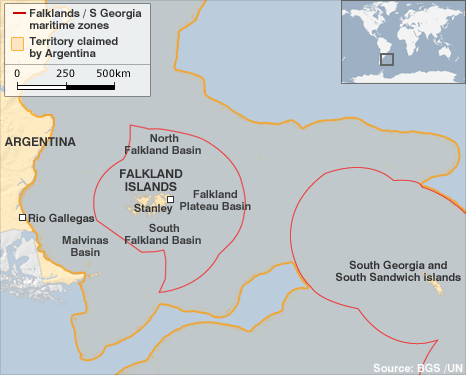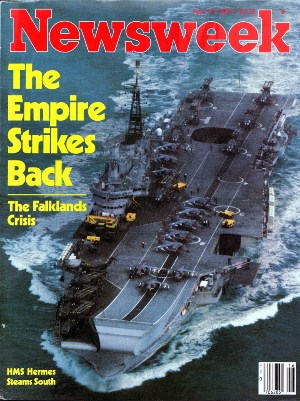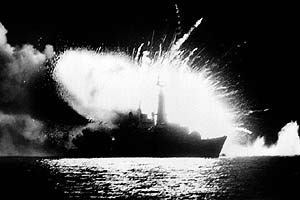Yesterday, I sent a Twitter update linking an article about rising tensions between Argentina and the United Kingdom over the Falkland Islands:
The South American trade group Mercosur, wrapping up a two-day summit in Uruguay, has sided with Argentina in its ongoing dispute about the Falkland Islands, which it calls the Malvinas, announcing it will ban boats with Falkland Islands flags from their ports.
[. . .]
Note the flurry of activity since 2010. The dispute has become heightened over resources, as British firms explore for oil in the waters surrounding the islands.
 I described the article at the link as “early moves in the next Falklands War”. I then followed up with a another Tweet: “Of course, if Argentina decides to take the Falkland Islands, Britain no longer has the navy to stop them. No carriers = no force projection”
I described the article at the link as “early moves in the next Falklands War”. I then followed up with a another Tweet: “Of course, if Argentina decides to take the Falkland Islands, Britain no longer has the navy to stop them. No carriers = no force projection”
This struck Craig Chandler as seriously misunderstanding the risks: “War can still happen. Do not delude yourself.” I responded that I was “Not deluded about risk of war. Just realistic about outcome.” That is, I didn’t think Britain had any chance of pulling off a victory if Argentina resorted to the military option (again).
Craig had a remarkably positive view of British military power: “Britain would crush them. Missiles, Jets etc… Lot’s of ways to fight a modern war” and “Britain allies would join with them. An attack on one of us is an attack on all of us. Thus, victory would be 100% for Britain”. I responded “Even Reagan had to be cajoled into supporting Thatcher in 82. Obama? Doubt he feels any strong attachment to the UK.” “The UK would have to lodge protest in UN, impose trade sanctions, sit back and accept facts on the ground.”
I was starting to struggle with Twitter’s 140 character limit, as there was much I wanted to say that couldn’t easily be condensed into Twitter-friendly lengths. I’ve said on the blog that Britain’s scrapping of the Harriers and decommissioning/scrapping the remaining aircraft carriers was an open invitation to Argentina to try the Falklands issue again. Argentina’s President Cristina Kirchner wouldn’t be using words like “arrogant” (describing the British government) and characterizing the Prime Minister’s comments as an “expression of mediocrity and almost of stupidity” without good reason.
 Britain was lucky in 1982, as the government of the day was desperately seeking economies in the budget and (as there was no war with anyone on the horizon), scrapping their aircraft carriers looked like a great way of reducing costs. They’d reduced their military presence in the South Atlantic in an attempt to both save money and appease Argentinian feelings. The announced reductions prompted Argentina’s military rulers to use an external war for internal political benefit. Argentina struck before the intended “economizing” took place. Had they waited six months, Britain would not have had the means to launch the counter-attack that retook the Falklands.
Britain was lucky in 1982, as the government of the day was desperately seeking economies in the budget and (as there was no war with anyone on the horizon), scrapping their aircraft carriers looked like a great way of reducing costs. They’d reduced their military presence in the South Atlantic in an attempt to both save money and appease Argentinian feelings. The announced reductions prompted Argentina’s military rulers to use an external war for internal political benefit. Argentina struck before the intended “economizing” took place. Had they waited six months, Britain would not have had the means to launch the counter-attack that retook the Falklands.
 Even with the aircraft carriers HMS Hermes and HMS Invincible each operating several extra Harriers, the British were just barely able to keep enough aircraft going to fend off the majority of Argentinian attacks (losing two destroyers, two frigates, and several support ships sunk or severely damaged). With the Argentinian navy almost entirely confined to base after the sinking of the ARA Belgrano, the British could concentrate on air defence.
Even with the aircraft carriers HMS Hermes and HMS Invincible each operating several extra Harriers, the British were just barely able to keep enough aircraft going to fend off the majority of Argentinian attacks (losing two destroyers, two frigates, and several support ships sunk or severely damaged). With the Argentinian navy almost entirely confined to base after the sinking of the ARA Belgrano, the British could concentrate on air defence.
Having fought the fleet into position for the invasion, it was possible to pull the more vulnerable ships further out of range for Argentinian air strikes (as even at this stage, losing one of the carriers would endanger the entire mission). While it was much more than a “mere matter of marching”, the smaller but much better trained British forces (primarily Royal Marines, paratroops, Guards, and Gurkhas) were able to defeat the Argentinian troops and bring the military campaign to a close.
Anyway, Craig had an even more positive view of Britain’s likely political and military support today: “The USA owes the UK much for Iraq and Afghanistan there is also the entire Common Wealth. Argentina would be invaded.” “It would be all out war. No acceptance. The Common Wealth and other UK allies would come to support.” I think there’d be some forms of support short of military action: in 1982, for example, New Zealand sent a frigate to the Indian Ocean to replace a Royal Navy ship that was needed to support the Task Force. The rest of the Commonwealth gave verbal and diplomatic support, but no significant military assistance. Today’s Commonwealth is hardly a significant military player — Canada, Australia, and New Zealand combined could not even provide a full division of troops, and none of them would be willing to get involved in a land war in South America on Britain’s behalf.
As far as the islands themselves, there have been some significant changes since 1982, the most significant being a new Royal Air Force base with permanently stationed modern Typhoon fighters (although only four of them at last report). The island transportation net has vastly improved since 1982 — when the only permanent roads were within Port Stanley proper — with all-weather roads now linking all mainland settlements. In addition to the RAF base personnel, there is a British garrison force of a reinforced infantry company and supporting troops, and the Falkland Islands Defence Force which is a company-sized unit of part-time troops.
Argentina’s armed forces have also changed significantly since the war. Two of the most significant changes were post-war fall of the military Junta and the elimination of conscription (creating a more modern, better-trained professional army, navy and air force). The Argentinian navy no longer has a purpose-built landing ship (the ARA Cabo San Antonio was retired shortly after the war and replaced with a modified cargo vessel). They have three submarines in service (replacing the one sub active in 1982), and have replaced all their WW2-vintage ships with more modern designs from France and Germany. The marines, who were the best of the Argentinian troops in 1982, are organized in five battalions of infantry, with supporting artillery, anti-aircraft, engineering and special forces detachments.
Anyway, back to the Twitter exchange that started this. After I’d responded to Craig’s last comment, Colby Cosh joined the discussion: “Sign me up for a bet on 2 PARA if it comes to that, will you?”. I’ll just reproduce the rest of the exchange in approximately correct order below:
NR: “Admire the Paras, but you can’t drop from that far away.”
CC: “I guess they must have teleported onto Goose Green last time.”
NR: “They certainly didn’t fly in from Heathrow!”
CC: “I’m guessing they’ll use the Bay-class ships they built for pretty much that exact mission?”
NR: “Not without air cover.”
CC: “I’m no admiral, but somehow I did get the memo about the fetish for “capital ships” being obsolete.”
NR: “Carriers still relevant.”
CC: “Meanwhile, the Argie navy has not exactly thrived under civilian rule. Not sure if that’s relevant?”
NR: “For a short-haul invasion, you don’t need a massive navy. Air cover is the key. UK only has 1 sub in region normally.”
NR: “No way at all to prevent an invasion, but in 82 UK still had (barely enough) carrier air to cover counter-attack. No longer true”
CC: “Air cover *less* important for Bay class now with close-in antimissile guns. And RN is still operating two carriers, you know.”
NR: “UK paid off Ark Royal and Invincible. Replacement ships still years from launching.”
CC: “The RN just tried out HMS Ocean (I think it was Ocean) as a platform for Apache in the Gadhafi raids.”
CC: “Replacements for fixed-wing capability, yes. Ocean & Illustrious are configured for choppers now.”
NR: “Chopper-equipped force versus missile-armed fighters? Outcome not good for choppers without lots of luck.”
CC: “Helicopters are the name of the game in an amphib op anyway; hence the reconfig.”
NR: “For amphibious work, choppers are great support. Not designed to fight against fixed-wing fighters.”
CC: “We’re forgetting that the islands themselves are garrisoned much more heavily than in ’82.”
NR: “Still indefensible vs Arg”
CC: “The Typhoons that are there are certainly at the sharp end until RN’s Harriers are replaced.”
NR: “Not enough of them to matter.”
CC: “You’ve convinced me to worry about this a little more than I would’ve”
NR: “I’ll post a “Mission Accomplished” banner. ;-)”
Colby did point out some weaknesses in my original contention: for example, I’d forgotten about the construction of the new RAF base, but it isn’t equipped to fight a war: it’s an expensive trip-wire. Four aircraft aren’t going to be enough (especially as Britain had, as of the Libya campaign, only 69 qualified Typhoon pilots). I’ll admit I’m a bit less sanguine about Argentina just waltzing in to Port Stanley this time, but I still think if they can pull off a quick disabling strike followed by a landing, Britain will not be able to reverse the outcome like they did in 1982.




Understanding that the military realities were the focus of your discussion, don’t you have to think that Argentina’s reasonably stable democracy is far less likely to start a war than the junta was (erm, I guess that’s a nonsense question, since the chance the junta would start a war was revealed to be 100%…)?
I have no sense of the popular sentiment in Argentina, but it’s awfully hard to describe such an act as a war of liberation when the long-present residents of the islands very much do not want to be liberated.
Comment by Ryan Cousineau — December 22, 2011 @ 16:29
I don’t speak Spanish, so I don’t have a direct feel for the current feeling in Argentina. Filtered through what does get translated into English, the majority do seem to feel that the Islas Malvinas do belong to Argentina and should be “repatriated” to the homeland. Whether they feel strongly enough to support military action is, as you say, not clear.
The current residents of the islands are few enough that most Argentinians don’t seem to consider their concerns to be valid (again, based on the limited sources I’ve seen).
Comment by Nicholas — December 22, 2011 @ 16:40
The British attack sub fleet is among the world’s best. The Argentines can’t take the island without landing a substantial number of troops. They’re not going to be able to move any shipping through that area if the Royal Navy deploys nuclear attack subs. The Typhoon “tripwire” would also be fairly formidable against an Argentine air force of 15 obsolete fighter and 26 ground attack aircraft. The same aircraft had a hard time against Sea Harriers in 1982 – do you think they’d do better against a fighter 1-2 generations more advanced?
Comment by George Skinner — December 22, 2011 @ 17:31
The Royal Navy’s submariners may well be as good as you say (and I’m willing to grant that), but if they’re not in the vicinity, they’re not going to be useful as a defence. Most sources I’ve seen indicate that the RN typically only has a single submarine in the South Atlantic at any given time. In fact, this recent article implies that there isn’t even one sub on regular patrol there now.
Wikipedia’s summary shows the numbers you quote, plus another couple of dozen Pucara ground-attack planes (admittedly of last war vintage). Not the most impressive air fleet . . . but they wouldn’t be trying to dogfight against Typhoons anyway. Four planes could be rendered temporarily unfly-able through special forces action. Create enough of a window to land a couple of battalions of marines, and it’s game over. A reinforced company plus a reservist company are not enough force to defeat what Argentina could land fairly quickly. If the RAF is taken out of the equation for long enough, it’s a done deal.
Comment by Nicholas — December 22, 2011 @ 17:52
I heard some rumour that the EU is whipping up the Argentinians through its connections in Mercosur. The EU entered into negotiations in 2000 with Mercusor for a political dialogue, cooperation and free trade agreement. This was called as Association Agreement. Although the free trade negotiations fell apart in 2004, the political dialogue has continued including an agreement made at the Summit of Lima (2008)to extend relations in renewable energy. Strangely enough, Argentina has been agitating since the UK started drilling for oil. The EU is desperate that fossil fuels not regain ascendancy again over renewables.
Comment by Wallhouse Wart — December 22, 2011 @ 22:07
Count me amongst the gloomy heralds of war, I concur with your assessment Nicholas.
As you suggest, the airfield could be captured via airborne assault without engaging the Typhoonsnall. Or the runway could be cratered and covered with cluster bomblets to prevent the Typhoons from launching.
One can’t win a war on airpower alone, but you can still lose without it. No air cover = goodbye surface / ground assets.
Since Argentina’s argument basically amounts to “they are closer to us than to you”, and sets aside any democratic or cultural considerations, I submit there are plenty of other islands that could be more plausibly argued. Cuba’s much closer to the US than the Falklands are to Argentina, for example; St. Pierre and Miquelon are closer to Canada than France; Greenland is closer to Canada than Denmark, etc. Start leaning on the EU to put pressure on Mercosur or their distant territories get it.
Comment by Chris Taylor — December 23, 2011 @ 02:08
Craig had a remarkably positive view of British military power: “Britain would crush them. Missiles, Jets etc… Lot’s of ways to fight a modern war” and “Britain allies would join with them. An attack on one of us is an attack on all of us. Thus, victory would be 100% for Britain”.
Patriotic bluster is awesome – nothing like being bellicose safely behind a desk. The world changes, a bit, when one is slogging through knee-deep mud with a heavy pack and rifle. 20-year old me hated politicians like this guy for never having humped a pack and 44-year old me isn’t much friendlier about it.
Assuming Argentina has the political will to beat four fighters and a company of infantry (plus the part time guys, if they get out of bed before the battle is over) then they’ve won the war. Game over.
The only country in the world, right now, that could kick them off the island is the US because (sorry) we’re the only country that can project the overwhelming power one needs to do the job.
And I’m sorry because I don’t see a damned thing there worth fighting over. I guess we could _rent_ you guys a pair of carriers and their air wing, but you gotta supply the man power.
Comment by Brian Dunbar — December 23, 2011 @ 15:28